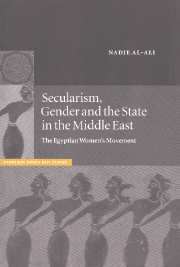Book contents
- Frontmatter
- Contents
- Acknowledgements
- Note on transliteration
- List of groups, networks and organizations
- List of abbreviations
- Introduction
- 1 Up against conceptual frameworks: post-orientalism, occidentalism and presentations of the self
- 2 Contextualizing the Egyptian women's movement
- 3 Self and generation: formative experiences of Egyptian women activists
- 4 Secularism: challenging neo-orientalism and ‘his-stories’
- 5 From words to deeds: priorities and projects of contemporary activists
- 6 A mirror of political culture in Egypt: divisions and debates among women activists
- Conclusion: ‘standing on shifting ground’
- Bibliography
- Index
- Other books in the series
5 - From words to deeds: priorities and projects of contemporary activists
Published online by Cambridge University Press: 22 September 2009
- Frontmatter
- Contents
- Acknowledgements
- Note on transliteration
- List of groups, networks and organizations
- List of abbreviations
- Introduction
- 1 Up against conceptual frameworks: post-orientalism, occidentalism and presentations of the self
- 2 Contextualizing the Egyptian women's movement
- 3 Self and generation: formative experiences of Egyptian women activists
- 4 Secularism: challenging neo-orientalism and ‘his-stories’
- 5 From words to deeds: priorities and projects of contemporary activists
- 6 A mirror of political culture in Egypt: divisions and debates among women activists
- Conclusion: ‘standing on shifting ground’
- Bibliography
- Index
- Other books in the series
Summary
If individual experiences as well as broader political developments result in different entry points into the women's movement, questions about content and form of activism have to be asked. What do secular-oriented women activists in contemporary Egypt want? Do they all strive towards the same goals? How do they translate their priorities into action? What actions do they engage in? And how effective are they?
These were the questions on my mind when I interviewed women activists, read their publications and participated in their activities. On several occasions, when I actually put those questions forward, accounts of women activists' own goals and projects included references to the activities of other groups, often signalling, if not explicitly stating, criticism or disapproval. Some objected to the degree of research-oriented work and described it as being removed from ‘real concerns and issues’. Others criticized service-oriented groups for their apolitical approach. In other words, there appear to be incommensurable differences among groups concerning the content and form of women's activism in Egypt today. Or, as I will try to inquire, could these incompatibilities actually be exaggerated by the women activists themselves? Is there a tendency to turn a blind eye to commonalities and grounds for alliance and stress differences instead?
In this chapter I shall first examine the stated goals and priorities of the various groups and individual activists I interviewed.
- Type
- Chapter
- Information
- Secularism, Gender and the State in the Middle EastThe Egyptian Women's Movement, pp. 149 - 184Publisher: Cambridge University PressPrint publication year: 2000



